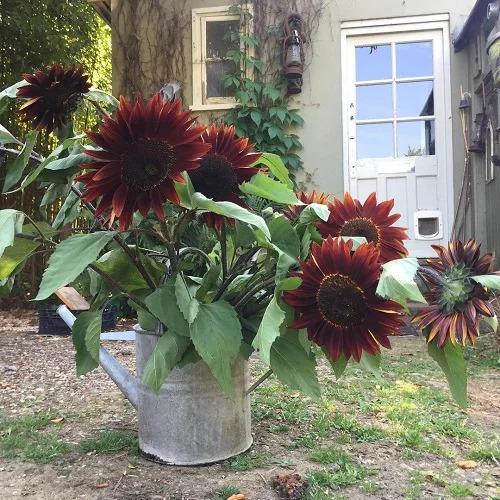Identifying and Preventing Pests and Diseases
Black sunflowers, like any other plant, can fall victim to pests and diseases. Identifying these issues early and taking preventive measures is crucial to ensure your sunflowers thrive.
Identifying Common Pests
1. Aphids
Aphids are small, soft-bodied insects that can gather on the leaves and stems of your black sunflowers.
They feed by sucking sap from the plant, which can lead to wilting and distortion of leaves.
Identification: Look for clusters of small, green, black, or brown insects on the sunflower’s tender growth. Aphids can also produce a sticky residue called honeydew.
2. Birds
Birds can be attracted to sunflower seeds and may peck at the flower heads or eat the seeds before they fully mature.
Identification: Keep an eye out for missing or damaged seeds, or evidence of bird activity around your sunflower plants.
3. Slugs and Snails
Slugs and snails are common garden pests that can feast on young sunflower seedlings and leaves.
Identification: Check for slime trails, irregular holes in leaves, and partially eaten sunflower seedlings.
Preventing and Managing Pests
A. Cultural Practices
- Companion Planting: Plant sunflowers alongside pest-repelling plants like marigolds or nasturtiums.
- Crop Rotation: Avoid planting sunflowers in the same spot year after year to disrupt pest life cycles.
- Regular Inspection: Inspect your sunflowers regularly for signs of pests and take action promptly.
B. Organic Pest Control
- Beneficial Insects: Encourage natural predators like ladybugs, lacewings, and parasitic wasps to control aphid populations.
- Neem Oil: Use neem oil as a natural pesticide for aphid control.
- Physical Barriers: Cover your sunflower heads with lightweight netting to deter birds.
By identifying these common pests and implementing preventive measures, you can protect your black sunflowers from potential damage.
However, pests are only one part of the equation; diseases can also pose a threat to your sunflowers.
Maximizing Flower Production
Black sunflowers are not only prized for their unique appearance but also for their stunning blooms. To enjoy a garden bursting with these dark, captivating flowers, it’s essential to understand the factors that influence flower production and how to optimize them. In this section, we’ll explore how to maximize flower production in your black sunflowers.
Factors Affecting Flower Production
1. Sunlight
Sunlight is a critical factor in flower production for all sunflower varieties, including black sunflowers.
These plants thrive in full sun, so ensure they receive at least 6-8 hours of direct sunlight each day. If your garden has shady spots, consider relocating your sunflowers to sunnier areas.
2. Soil Quality
The quality of your soil directly impacts flower production. Black sunflowers prefer well-draining soil with good fertility. Here’s what you need to know:
- Soil Texture: Loose, loamy soil is ideal for sunflowers. It allows for proper root development and nutrient absorption.
- Soil pH: Aim for a slightly acidic to neutral pH (around 6.0 to 7.5). Soil that’s too acidic or alkaline can hinder nutrient uptake.
3. Watering Practices
Proper watering is essential for black sunflowers. While they can tolerate some drought, consistent moisture is key to abundant flower production. Here’s how to strike the right balance:
- Deep Watering: Water deeply at the base of the plants to encourage deep root growth.
- Mulching: Apply a layer of organic mulch around the base of your sunflowers to help retain moisture and regulate soil temperature.
4. Plant Health and Genetics
Healthy, well-nourished sunflowers are more likely to produce an abundance of flowers. Selecting healthy seedlings and providing adequate nutrients through fertilization can make a significant difference.
Strategies for Increasing Flower Production
A. Soil Preparation
- Amend the Soil: Before planting, enrich the soil with compost or well-rotted organic matter to boost fertility.
- Loosen Soil: Ensure the soil is well-aerated to promote root growth. Use a fork or tiller if necessary.
B. Watering and Fertilization
- Consistent Watering: Maintain consistent soil moisture throughout the growing season.
- Fertilize Appropriately: Apply a balanced fertilizer or a fertilizer high in phosphorus to encourage flower development.
C. Deadheading and Pruning
- Deadheading: Remove spent blooms regularly to encourage the plant to produce more flowers.
- Pruning: If your sunflowers become excessively tall, consider pruning or pinching them back to promote lateral growth and more flower buds.
Troubleshooting Flowering Issues
Sometimes, despite your best efforts, you may encounter issues related to poor flower production. If you notice:
- Few or No Flowers: Check if your sunflowers are getting sufficient sunlight and nutrients. Adjust their care regimen accordingly.
- Small or Deformed Flowers: This can be a sign of nutrient deficiencies. Test your soil and address any nutrient imbalances.
By implementing these strategies and troubleshooting any flowering issues promptly, you can maximize the beauty and visual impact of your black sunflower garden.
Sunflower Growth and Stunting
While black sunflowers are known for their striking appearance, achieving healthy and robust growth is essential to showcase their beauty.
Factors Contributing to Stunted Growth
1. Environmental Factors
Soil Conditions:
The quality of your soil plays a pivotal role in sunflower growth. Factors to consider include soil type, drainage, and fertility.
- Soil Type: Sunflowers thrive in well-draining soil. Heavy clay soils can impede root development and lead to stunted growth.
- Drainage: Poor drainage can cause waterlogged roots and hinder nutrient uptake.
- Fertility: Soil lacking essential nutrients can stunt growth. Ensure your soil is well-nourished.
Competition with Other Plants:
Overcrowding and competition for resources like sunlight, water, and nutrients can limit sunflower growth. Proper spacing and companion planting are crucial.
- Spacing: Sunflowers need adequate spacing between plants to prevent crowding and resource competition.
- Companion Planting: Consider planting sunflowers with compatible companion plants that won’t overshadow or outcompete them.
Water Stress:
Both overwatering and underwatering can lead to stunted growth. Sunflowers require consistent moisture without waterlogged conditions.
- Deep Watering: Water deeply at the base of the plant to encourage deep root growth.
- Mulching: Apply mulch to retain soil moisture and regulate temperature.
2. Common Gardening Mistakes
Sometimes, stunted growth can be attributed to common gardening errors:
- Planting Too Deep: Planting sunflower seeds too deep in the soil can delay germination and limit initial growth.
- Overfertilization: Excessive fertilizer application can lead to nutrient imbalances that hinder growth.
- Neglecting Soil Health: Poor soil health, including imbalanced pH or nutrient deficiencies, can stunt growth.
Promoting Healthy Growth
A. Soil Preparation
- Soil Testing: Conduct a soil test to determine its pH and nutrient levels. Amend the soil as needed to create optimal conditions for growth.
- Loosening Soil: Ensure the soil is well-aerated by tilling or forking it to promote healthy root development.
- Proper Drainage: Address drainage issues by amending the soil or using raised beds in poorly draining areas.
B. Spacing and Companion Planting
- Optimal Spacing: Follow recommended spacing guidelines for your specific sunflower variety to avoid overcrowding.
- Companion Plants: Choose companion plants that complement sunflowers and won’t compete for resources.
C. Watering and Nutrition
- Consistent Watering: Maintain a consistent watering schedule to provide adequate moisture without waterlogging.
- Balanced Fertilization: Use a balanced fertilizer or one specifically formulated for sunflowers to ensure they receive the nutrients they need.
Troubleshooting Stunted Growth
If you’ve already noticed signs of stunted growth in your black sunflowers, here are some steps to take:
- Identify the Issue: Examine your plants for signs of stress, such as yellowing leaves or slow growth.
- Address Specific Problems: Based on your observations, address specific issues such as nutrient deficiencies or water stress.
- Pruning: In cases of excessive height without lateral growth, consider pruning to encourage branching and more flower buds.
Overcoming Germination Challenges
The journey to a flourishing black sunflower garden begins with successful germination.
However, germination can sometimes be a tricky process with various challenges that gardeners face.
Factors Affecting Germination
1. Soil Temperature and Moisture
Soil Temperature: Sunflowers, including black sunflowers, prefer warm soil for germination. Cold soil can delay or inhibit the germination process.
Soil Moisture: Proper moisture levels are essential for seed germination. Inconsistent or overly dry conditions can hinder seed sprouting.
2. Seed Quality
The quality of the sunflower seeds you use plays a crucial role in successful germination. Older or damaged seeds may have a lower germination rate.
3. Planting Depth
Planting sunflower seeds at the correct depth is vital. Seeds buried too deeply may struggle to reach the surface, while those planted too shallowly may dry out or become vulnerable to pests.
Improving Germination Rates
A. Soil Preparation
- Soil Temperature: Use a soil thermometer to monitor soil temperature. Ensure it’s consistently above 50°F (10°C) before planting your black sunflower seeds.
- Soil Moisture: Maintain consistent soil moisture levels. Water the soil evenly before planting and keep it consistently moist during the germination period.
B. Seed Selection
- Choose High-Quality Seeds: Purchase fresh, high-quality black sunflower seeds from reputable suppliers to maximize germination rates.
- Seed Soaking: Soaking seeds in warm water for a few hours before planting can improve germination rates.
C. Planting Depth
- Follow Seed Packet Instructions: Consult the instructions on your seed packet for the recommended planting depth. Typically, sunflower seeds should be planted about 1 inch deep.
- Seed Spacing: Ensure proper spacing between seeds to prevent overcrowding and competition.
D. Germination Environment
- Warmth: Consider using a seedling heat mat to maintain the optimal soil temperature for germination.
- Humidity: Covering the planted area with plastic or a humidity dome can help retain moisture during germination.
Troubleshooting Germination Issues
If you encounter germination issues, don’t lose hope. Here are some troubleshooting steps to consider:
- Slow Germination: Be patient, as germination can take some time. Ensure proper soil temperature and moisture levels.
- Uneven Germination: Some seeds may sprout earlier than others. If necessary, thin out overcrowded seedlings when they are a few inches tall.
- No Germination: If you see no signs of germination after a reasonable period (typically 10-14 days), you may need to replant with fresh seeds.
Remember that germination can vary based on environmental conditions, so it’s essential to monitor and adjust your approach as needed.
By following these tips and troubleshooting steps, you can increase your chances of successful germination and set the stage for healthy, thriving black sunflowers.
The Importance of Soil Quality
The foundation of a healthy black sunflower garden lies beneath the surface—the soil. Soil quality plays a pivotal role in the growth and success of your sunflowers.
Soil Characteristics for Black Sunflowers
1. Soil Type and Texture
Black sunflowers, like their traditional counterparts, prefer well-draining soil with a loamy texture.
Loam is a balanced soil type that offers good aeration and water retention. It allows sunflower roots to penetrate easily and access essential nutrients.
Identification: You can determine your soil’s texture by conducting a simple “feel test.” Squeeze a handful of moist soil; if it forms a ball but crumbles easily when touched, it likely has a loamy texture.
2. Soil pH
Soil pH measures the acidity or alkalinity of the soil and significantly influences nutrient availability. Black sunflowers thrive in slightly acidic to neutral soil, with a pH range of around 6.0 to 7.5.
Testing pH: You can test your soil’s pH using a pH testing kit available at garden centers or by sending a soil sample to a local agricultural extension office for analysis.
3. Soil Fertility
Fertile soil provides essential nutrients for sunflower growth. Key nutrients include nitrogen (N), phosphorus (P), and potassium (K), along with micronutrients like iron (Fe) and magnesium (Mg).
Nutrient Deficiencies: Soil lacking these nutrients can result in poor growth, reduced flowering, and overall plant stress.
Testing and Amending Soil
A. Soil Testing
Before planting black sunflowers, it’s crucial to understand your soil’s current condition. A soil test provides valuable insights into your soil’s pH, nutrient levels, and any potential deficiencies.
- DIY Testing Kits: Use DIY soil testing kits to measure pH and get a rough idea of nutrient levels.
- Professional Testing: Consider sending a soil sample to a local agricultural extension office for a comprehensive analysis.
B. Soil Amendment
Based on the results of your soil test, you can amend your soil to create the ideal growing conditions for black sunflowers.
- Adjusting pH: If your soil is too acidic or alkaline, amend it with lime to raise pH or sulfur to lower pH.
- Adding Nutrients: Use organic matter like compost or well-rotted manure to improve soil fertility and provide essential nutrients.
C. Soil Maintenance
Regular soil maintenance is essential to ensure your black sunflowers continue to thrive:
- Mulching: Apply organic mulch around the base of your sunflowers to retain moisture, suppress weeds, and regulate soil temperature.
- Soil Testing Over Time: Periodically retest your soil to track changes and make necessary adjustments.
Troubleshooting Soil-Related Issues
If you encounter problems related to soil quality in your garden, such as nutrient deficiencies or drainage issues, here are some steps to take:
- Identify the Issue: Observe your sunflowers for signs of stress or nutrient deficiency, such as yellowing leaves or stunted growth.
- Soil Test Follow-Up: Perform follow-up soil tests to assess the effectiveness of your amendments.
- Regular Soil Care: Continue to maintain healthy soil through proper watering, mulching, and nutrient management.
By prioritizing soil quality and taking the necessary steps to improve it, you can create an optimal environment for your black sunflowers to flourish.
.
.
.
source image: https://www.instagram.com/p/CDvsnEsAhue/?utm_source=ig_web_copy_link



